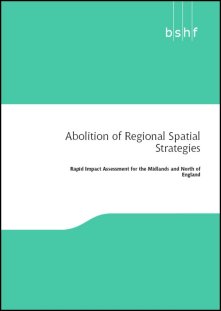
The research is a rapid impact assessment on the response of local authorities to this major change in planning policy. It focuses particularly on the impact of the changes on regions in the Midlands and the North of England.
Some of the main findings of the research are:
- There has been a substantial delay in replacing house building targets following the abolition of the Regional Spatial Strategies. Approximately one third of local authorities (32 per cent) in the East Midlands were undecided on their housing targets, with similar figures across the remainder of the regions of the Midlands and the North of England.
- Many local authorities intend to keep the housebuilding targets from regional strategies. In the East Midlands, over one third of local authorities (38 per cent) stated their intention to keep the housing targets in the Regional Spatial Strategies.
- Some local authorities responding to the research were struggling to understand the nature and scope of their new responsibilities. There appeared to be particular confusion about implied default housing target (the so called ‘Option 1’ figure).
- Local authorities were concerned that they do not have the financial or technical resources to assess local housing need, particularly given removal of support from regional bodies and organisations such as the National Housing and Planning Advice Unit.



Join the discussion